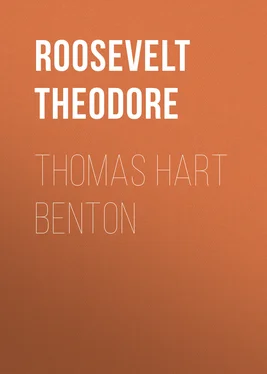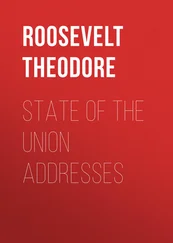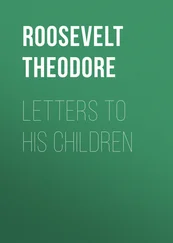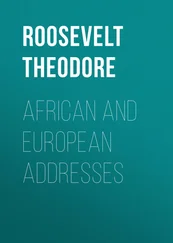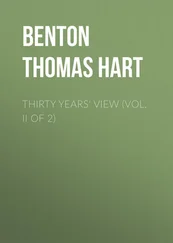Theodore Roosevelt - Thomas Hart Benton
Здесь есть возможность читать онлайн «Theodore Roosevelt - Thomas Hart Benton» — ознакомительный отрывок электронной книги совершенно бесплатно, а после прочтения отрывка купить полную версию. В некоторых случаях можно слушать аудио, скачать через торрент в формате fb2 и присутствует краткое содержание. Жанр: foreign_prose, История, foreign_edu, foreign_antique, на английском языке. Описание произведения, (предисловие) а так же отзывы посетителей доступны на портале библиотеки ЛибКат.
- Название:Thomas Hart Benton
- Автор:
- Жанр:
- Год:неизвестен
- ISBN:нет данных
- Рейтинг книги:4 / 5. Голосов: 1
-
Избранное:Добавить в избранное
- Отзывы:
-
Ваша оценка:
- 80
- 1
- 2
- 3
- 4
- 5
Thomas Hart Benton: краткое содержание, описание и аннотация
Предлагаем к чтению аннотацию, описание, краткое содержание или предисловие (зависит от того, что написал сам автор книги «Thomas Hart Benton»). Если вы не нашли необходимую информацию о книге — напишите в комментариях, мы постараемся отыскать её.
Thomas Hart Benton — читать онлайн ознакомительный отрывок
Ниже представлен текст книги, разбитый по страницам. Система сохранения места последней прочитанной страницы, позволяет с удобством читать онлайн бесплатно книгу «Thomas Hart Benton», без необходимости каждый раз заново искать на чём Вы остановились. Поставьте закладку, и сможете в любой момент перейти на страницу, на которой закончили чтение.
Интервал:
Закладка:
Much maudlin nonsense has been written about the governmental treatment of the Indians, especially as regards taking their land. For the simple truth is that they had no possible title to most of the lands we took, not even that of occupancy, and at the most were in possession merely by virtue of having butchered the previous inhabitants. For many of its actions towards them the government does indeed deserve the severest criticism; but it has erred quite as often on the side of too much leniency as on the side of too much severity. From the very nature of things, it was wholly impossible that there should not be much mutual wrong-doing and injury in the intercourse between the Indians and ourselves. It was equally out of the question to let them remain as they were, and to bring the bulk of their number up to our standard of civilization with sufficient speed to enable them to accommodate themselves to the changed condition of their surroundings. The policy towards them advocated by Benton, which was much the same as, although more humane than, that followed by most other Western men who have had practically to face the problem, worked harshly in many instances, and was the cause of a certain amount of temporary suffering. But it was infinitely better for the nation, as a whole, and, in the end, was really more just and merciful, than it would have been to attempt following out any of the visionary schemes which the more impracticable Indian enthusiasts are fond of recommending.
It was during Monroe's last term that Henry Clay brought in the first protective tariff bill, as distinguished from tariff bills to raise revenue with protection as an incident only. It was passed by a curiously mixed vote, which hardly indicated any one's future position on the tariff excepting that of Clay himself; Massachusetts, under the lead of Webster, joining hands with the Southern sea-coast states to oppose it, while Tennessee and New York split, and Missouri and Kentucky, together with most of the North, favored it. Benton voted for it, but on the great question of internal improvements he stood out clearly for the views that he ever afterwards held. This was first brought up by the veto, on constitutional grounds, of the Cumberland Road bill, which had previously passed both houses with singular unanimity, Benton's vote being one of the very few recorded against it. In regard to all such matters Benton was strongly in favor of a strict construction of the Constitution and of guarding the rights of the states, in spite of his devoted attachment to the Union. While voting against this bill, and denying the power or the right of the federal government to take charge of improvements which would benefit one state only, Benton was nevertheless careful to reserve to himself the right to support measures for improving national rivers or harbors yielding revenues. The trouble is, that however much the two classes of cases may differ in point of expediency, they overlap so completely that it is wholly impossible to draw a hard and fast line between them, and the question of constitutionality, if waived in the one instance, can scarcely with propriety be raised in the other.
With the close of Monroe's second term the "era of good feeling" came to an end, and the great Democratic-Republican party split up into several fragments, which gradually crystallized round two centres. But in 1824 this process was still incomplete, and the presidential election of that year was a simple scramble between four different candidates,—Jackson, Adams, Clay, and Crawford. Jackson had the greatest number of votes, but as no one had a majority, the election was thrown into the House of Representatives, where the Clay men, inasmuch as their candidate was out of the race, went over to Adams and elected him. Benton at the time, and afterwards in his "Thirty Years' View," inveighed against this choice as being a violation of what he called the "principle demos krateo"—a barbarous phrase for which he had a great fondness, and which he used and misused on every possible occasion, whether in speaking or writing. He insisted that, as Jackson had secured the majority of the electoral vote, it was the duty of the House of Representatives to ratify promptly this "choice of the people." The Constitution expressly provided that this need not be done. So Benton, who on questions of state rights and internal improvements was so pronounced a stickler for a strict construction of the Constitution, here coolly assumed the absurd position that the Constitution was wrong on this particular point, and should be disregarded, on the ground that there was a struggle "between the theory of the Constitution and the democratic principle." His proposition was ridiculous. The "democratic principle" had nothing more to do with the matter than had the law of gravitation. Either the Constitution was or it was not to be accepted as a serious document, that meant something; in the former case the election of Adams was proper in every aspect, in the latter it was unnecessary to have held any election at all.
At this period every one was floundering about in efforts to establish political relations, Benton not less than others; for he had begun the canvass as a supporter of Clay, and had then gone over to Crawford. But at the end he had become a Jacksonian Democrat, and during the rest of his political career he figured as the most prominent representative of the Jacksonian Democracy in the Senate. Van Buren himself, afterwards Jackson's prime favorite and political heir, was a Crawford man during this campaign.
Adams, after his election, which was owing to Clay's support, gave Clay the position of secretary of state in his cabinet. The affair unquestionably had an unfortunate look, and the Jacksonians, especially Jackson, at once raised a great hue and cry that there had been a corrupt bargain. Benton, much to his credit, refused to join in the outcry, stating that he had good and sufficient reasons—which he gave—to be sure of its falsity; a position which brought him into temporary disfavor with many of his party associates, and which a man who had Benton's ambition and bitter partisanship, without having his sturdy pluck, would have hesitated to take. The assault was directed with especial bitterness against Clay, whom Jackson ever afterwards included in the very large list of individuals whom he hated with the most rancorous and unreasoning virulence. Randolph of Roanoke, the privileged eccentric of the Senate, in one of those long harangues in which he touched upon everybody and everything, except possibly the point at issue, made a rabid onslaught upon the Clay-Adams coalition as an alliance of "the blackleg and the Puritan." Clay, who was susceptible enough to the charge of loose living, but who was a man of rigid honor and rather fond than otherwise of fighting, promptly challenged him, and a harmless interchange of shots took place. Benton was on the field as the friend of both parties, and his account of the affair is very amusing in its description of the solemn, hair-splitting punctilio with which it is evident that both Randolph and many of his contemporaries regarded points of dueling honor, which to us seem either absurd, trivial, or wholly incomprehensible.
Two tolerably well-defined parties now emerged from the chaos of contending politicians; one was the party of the administration, whose members called themselves National Republicans, and later on Whigs; the other was the Jacksonian Democracy. Adams's inaugural address and first message outlined the Whig policy as favoring a protective tariff, internal improvements, and a free construction of the Constitution generally. The Jacksonians accordingly took the opposite side on all these points, partly from principle and partly from perversity. In the Senate they assailed with turgid eloquence every administration measure, whether it was good or bad, very much of their opposition being purely factious in character. There has never been a time when there was more rabid, objectless, and unscrupulous display of partisanship. Benton, little to his credit, was a leader in these purposeless conflicts. The most furious of them took place over the proposed Panama mission. This was a scheme that originated in the fertile brain of Henry Clay, whose Americanism was of a type quite as pronounced as Benton's, and who was always inclined to drag us into a position of hostility to European powers. The Spanish-American States, having succeeded in winning their independence from Spain, were desirous of establishing some principle of concert in action among the American republics as a whole, and for this purpose proposed to hold an international congress at Panama. Clay's fondness for a spirited and spectacular foreign policy made him grasp eagerly at the chance of transforming the United States into the head of an American league of free republics, which would be a kind of cis-Atlantic offset to the Holy Alliance of European despotisms. Adams took up the idea, nominated ministers to the Panama Congress, and gave his reasons for his course in a special message to the Senate. The administration men drew the most rosy and impossible pictures of the incalculable benefits which would be derived from the proposed congress; and the Jacksonians attacked it with an exaggerated denunciation that was even less justified by the facts.
Читать дальшеИнтервал:
Закладка:
Похожие книги на «Thomas Hart Benton»
Представляем Вашему вниманию похожие книги на «Thomas Hart Benton» списком для выбора. Мы отобрали схожую по названию и смыслу литературу в надежде предоставить читателям больше вариантов отыскать новые, интересные, ещё непрочитанные произведения.
Обсуждение, отзывы о книге «Thomas Hart Benton» и просто собственные мнения читателей. Оставьте ваши комментарии, напишите, что Вы думаете о произведении, его смысле или главных героях. Укажите что конкретно понравилось, а что нет, и почему Вы так считаете.
